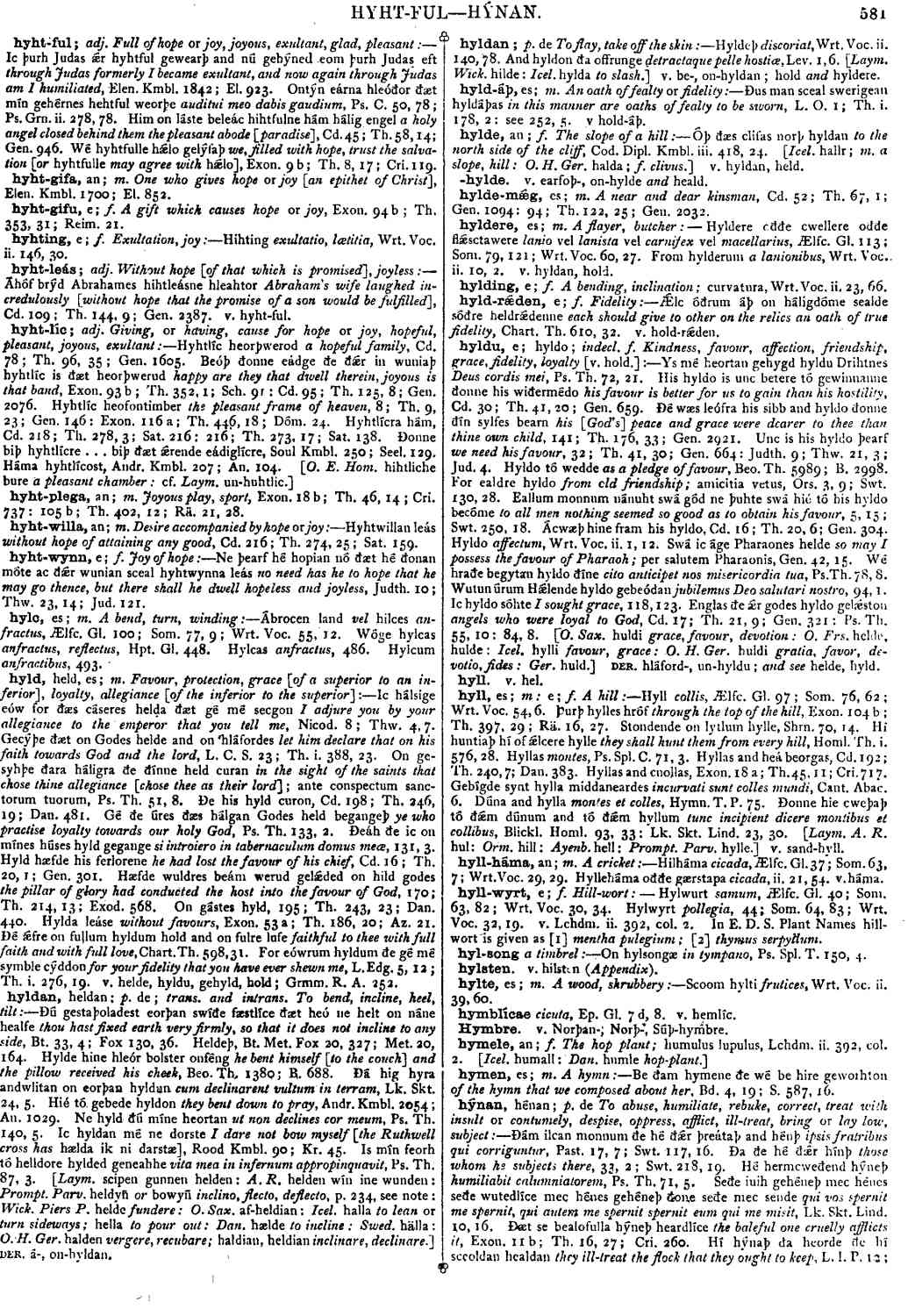hýnan
- verb [ weak ]
-
Ðám ilcan monnum ðe hé ðǽr þreátaþ and hénþ
ipsis fratribus qui corriguntur,
- Past. 17, 7 ;
- Swt. 117, 16.
-
Ða ðe hé ðǽr hínþ
those whom he subjects there,
- 33, 2 ;
- Swt. 218, 19 .
-
Hé hermcweðend hýneþ
humiliabit calumniatorem,
- Ps. Th. 71, 5 .
-
Seðe iuih gehéneþ mec hénes seðe wutedlíce mec hénes gehéneþ ðone seðe mec sende
qui vos spernit me spernit, qui autem me spernit spernit eum qui me misit,
- Lk. Skt. Lind. 10, 16.
-
Ðæt se bealofulla hýneþ heardlíce
the baleful one cruelly afflicts it,
- Exon. 11 b ;
- Th. 16, 27 ;
- Cri. 260 .
-
Hí hýnaþ ða heorde ðe hí sceoldan healdan
they ill-treat the flock that they ought to keep,
- L. I. P. 12 ;
- Th. ii. 320, 17 :
- Swt. A. S. Rdr. 109, 135 .
-
Ic hiora fýnd fylde and hýnde
ad nihilum inimicos eorum humiliassem,
- Ps. Th. 80, 13 .
-
Hé Godes hálgan hýnde mid wítum
he oppressed God's saints with torments,
- Homl. Th. ii. 310, 25.
-
Hé bebeád ðæt hié mon on ǽlce healfe hiénde
he ordered that they should be treated with insult on every side,
- Ors. 6, 3 ;
- Swt. 258, 6.
-
Se gúþsceaþa Geáta leóde hatode and hýnde,
- Beo. Th. 4627 ;
- B. 2319.
-
Hé heów and hýnde
he smote and felled,
- Byrht. Th. 141, 18 ;
- By. 324.
-
Hí Godes cyrican hýndan and bærndon
they evilly entreated and burned the churches of God,
- Chr. 684 ;
- Erl. 41, 22 .
-
Hý ða slógon and hýndon ðe ealle Rómáne friþian woldon,
- Ors. 4, 1 ;
- Bos. 79, 4 .
-
Hefe ðú ðíne handa and hýn hiora oferhygd
raise thine hand and humble their pride;
leva manum tuam in superbiam eorum in finem,
- Ps. Th. 73, 4.
-
Ne hén ðú
ne despicias,
- Rtl. 43, 13.
-
Hergian and hýnan
to ravage and ill-use,
- Ors. 4, 1 ;
- Bos. 79, 1.
-
Of ðæs handum ðe hine hýnan wolde
from the hands of him that would have laid him low,
- Homl. Th. ii. 510, 23.
-
Hé sceal rýperas and reáferas hatian and hýnan
robbers and plunderers he must hate and humble,
- L. I. P. 2 ;
- Th. ii. 304, 20.
-
Ic wolde helpan ðæs ðe unscyldig wǽre and hénan ðone ðe hine yfelode,
- Bt. 38, 6 ;
- Fox 208, 17.
-
Hénan ða yflan and fyrþrian ða gódan
to bring the evil low and to promote the good,
- 39, 2 ;
- Fox 212, 22 .
-
Ic eom frymdi tó ðé ðæt hí helsceaþan hýnan ne móton
I am suppliant to thee that fiends of hell may not evil entreat it [the soul ],
- Byrht. Th. 137, 3 ;
- By. 180 .
Bosworth, Joseph. “hýnan.” In An Anglo-Saxon Dictionary Online, edited by Thomas Northcote Toller, Christ Sean, and Ondřej Tichy. Prague: Faculty of Arts, Charles University, 2014. https://bosworthtoller.com/20320.
Checked: 1